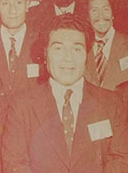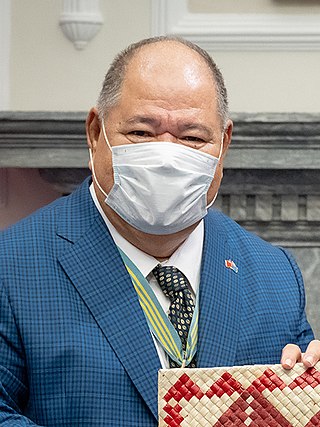The politics of Tuvalu takes place in a framework of a parliamentary representative democratic monarchy, whereby the monarch is the head of state, represented by the governor-general, while the prime minister is the head of government. Executive power is exercised by the government.
Sir Tomasi Puapua is a political figure who represented Vaitupu in the Parliament of Tuvalu. He attended the Fiji School of Medicine and the Otago University Medical School. He married Riana Puapua.

Sir Toaripi Lauti was a Tuvaluan politician who served as chief minister of the Colony of Tuvalu (1975–78), as the first prime minister following Tuvalu's independence (1978–1981) and governor-general of Tuvalu (1990–1993). He was married to Sualua Tui.
Tuvalu elects a legislature on a national level. The Parliament of Tuvalu has 16 members, elected for a four-year term in 8 double-seat constituencies. Tuvalu is a de facto non-partisan democracy since it does not have political parties. The political system is based on personal alliances and loyalties derived from clan and family connections. It does tend to have both a distinct government and a distinct opposition. The 16 members of the current parliament are elected from eight two-seat constituencies via plurality block voting.

Bikenibeu Paeniu, PC is a politician from Tuvalu. He represented the constituency of Nukulaelae in the Parliament of Tuvalu. He has served twice as the Prime Minister of Tuvalu, and now serving as Tuvaluan ambassador to Taiwan since June 2022.
Sir Tomu Malaefone Sione,, was a political figure from the Pacific nation of Tuvalu. He worked as a journalist from 1962 to 1968, and held the post of radio announcer in the Broadcasting and Information Department of the administration of the Gilbert and Ellice Islands Colony (GEIC). He was the head of the southern Niutao clan. He was married to Segali.

Seve Paeniu is a Tuvaluan politician. Paeniu was elected to the Parliament of Tuvalu in the 2019 Tuvaluan general election to represent the Nukulaelae electorate. He was appointed as the Minister of Finance in the Natano Ministry.

The Parliament of Tuvalu is the unicameral national legislature of Tuvalu. The place at which the parliament sits is called the Vaiaku maneapa. The maneapa on each island is an open meeting place where the chiefs and elders deliberate and make decisions.

Sir Kamuta Latasi is a political figure from the Pacific nation of Tuvalu from Funafuti atoll. He was elected to the Parliament of Tuvalu in 1992. Latasi served as the 4th prime minister, and foreign minister, from 1993 until 1996. He has served as the Speaker of parliament from 2006 to September 2010 and again from December 2010 to March 2014.
Naama Maheu Latasi, Lady Latasi, OBE was a political figure from the Pacific nation of Tuvalu. She stood for election in the constituency of Nanumea in 1989 and was elected to the Parliament of Tuvalu. Lady Latasi served as Minister of Health, Education and Community Services in the first Government of Prime Minister of Tuvalu Bikenibeu Paeniu. She was the first female member of parliament in Tuvaluan history. An amazing feat, that served to both pave the way for other aspiring female members of parliament today, but propelled the movement of gender equality. She served in Parliament from 1989 to 1997. Although she was not re-elected in the first 1993 general election but regained her seat in parliament in the second 1993 general election.
The Cabinet of Tuvalu is the executive branch of the government of Tuvalu.
General elections were held in Tuvalu on 8 September 1981. Voter turnout was 85%.
General elections were held in Tuvalu on 12 September 1985. As there were no political parties, all candidates for the twelve seats ran as independents, with nine of the incumbents retaining their seats. Tomasi Puapua was re-elected Prime Minister following the elections.
General elections were held in Tuvalu on 27 September 1989. Bikenibeu Paeniu was elected prime minister following the elections and formed a five-member cabinet composed largely of opponents of the previous prime minister Tomasi Puapua.
General elections were held in Tuvalu on 2 September 1993. As there were no political parties, all candidates for the twelve seats ran as independents. Prime Minister Bikenibeu Paeniu was re-elected, along with all members of his cabinet, except Naama Latasi. However, supporters of Paeniu held six seats while supporters of the previous Prime Minister Tomasi Puapua held the other six.
General elections were held in Tuvalu on 26 March 1998.
Otinielu Tauteleimalae Tausi is a politician from Tuvalu for the constituency of Nanumanga. He served as the speaker of the Parliament of Tuvalu from 2003 until 2006, then again from March 2014 onward, and has also been the deputy prime minister of Tuvalu.
A by-election was held in the Nukufetau constituency in Tuvalu as the consequence of the appointment of the opposition member of parliament Faimalaga Luka as the Governor-General of Tuvalu.
Henry Faati Naisali, CMG, AO, OBE was a Tuvaluan politician who served as Deputy Prime Minister of Tuvalu (1985-1989), Secretary General of the Pacific Islands Forum (1988-1992) and Pro-Chancellor of The University of the South Pacific (1985-1990). He is notable for co-founding the Tuvalu Trust Fund which lead Tuvalu to achieve greater financial autonomy.





